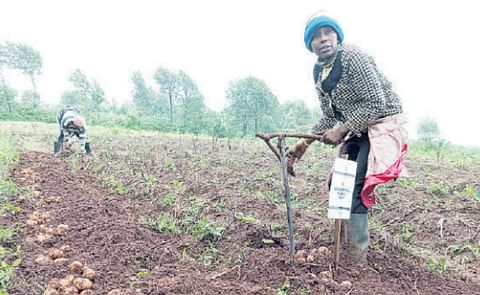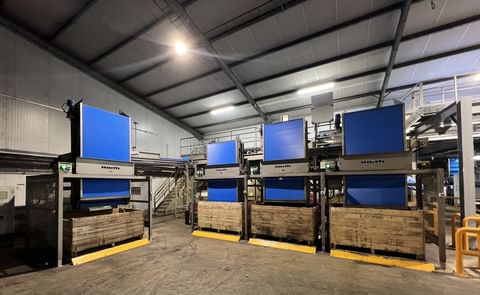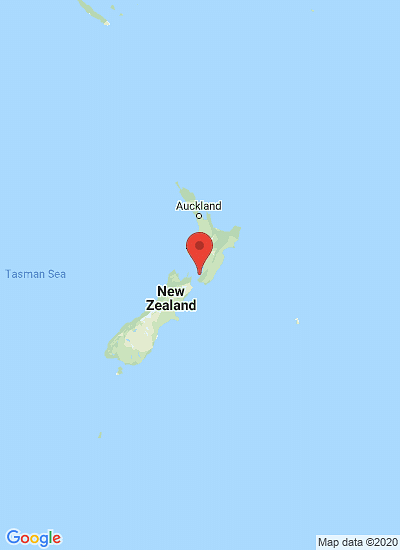Potato Psyllid
Potato Psyllids costly for New Zealand Potato Industry

A major pest called the tomato potato psyllid, has cost the potato industry over a $120 million since its initial discovery in 2006, according to a new report from Potatoes New Zealand.
Ron Gall, Business Manager for Potatoes New Zealand, presented the findings to delegates at the Potatoes New Zealand annual conference last month where he expressed his concerns about the impact on the industry.
“The New Zealand industry simply can’t afford to continue to absorb this scale of damage. Unless we get help to fund research on a solution to this problem, some growers will exit the industry and processors may have to close their doors” he said.
“The cost of psyllid to our industry alone last year was $28 million or 20 per cent of the value of industry at the farm gate.”
The costs were calculated based on crop impacts (yield and quality), control costs (extra insecticide, spray applications) and other costs such as seeds, monitoring and compliance.
The report on the Economic and Business Impacts of Potato Psyllid on the Potato Industry was conducted by ELAK Consultants. The survey was commissioned by Potatoes New Zealand with funding from the Sustainable Farming Fund. Forty-two growers, five processors and three seed merchants were interviewed for the report.
Terry Olsen, Chairman of Potatoes New Zealand, believes the potato industry is on the cusp of a national crisis. “Our industry is in a very difficult position. We know research is fundamental in finding a solution to the psyllid but our growers, and processors’ pockets are empty - we need more support from somewhere.”
“In total, Potatoes New Zealand has spent or committed about $1.3 million since the beginning of 2008 and quite frankly we have no more money to spend. We have received significant assistance from the Ministry of Agriculture and Forestry’s Sustainable Farming Fund in addition to Plant and Food Research but more help is needed,” says Mr Olsen.
The psyllid is a small plant-feeding insect, which transmits a disease that causes leaf yellowing, plant death, and brown markings – the “zebra chip” symptom in cooked potato tubers.
Ron Gall, Business Manager for Potatoes New Zealand, presented the findings to delegates at the Potatoes New Zealand annual conference last month where he expressed his concerns about the impact on the industry.
“The New Zealand industry simply can’t afford to continue to absorb this scale of damage. Unless we get help to fund research on a solution to this problem, some growers will exit the industry and processors may have to close their doors” he said.
“The cost of psyllid to our industry alone last year was $28 million or 20 per cent of the value of industry at the farm gate.”
The costs were calculated based on crop impacts (yield and quality), control costs (extra insecticide, spray applications) and other costs such as seeds, monitoring and compliance.
The report on the Economic and Business Impacts of Potato Psyllid on the Potato Industry was conducted by ELAK Consultants. The survey was commissioned by Potatoes New Zealand with funding from the Sustainable Farming Fund. Forty-two growers, five processors and three seed merchants were interviewed for the report.
Terry Olsen, Chairman of Potatoes New Zealand, believes the potato industry is on the cusp of a national crisis. “Our industry is in a very difficult position. We know research is fundamental in finding a solution to the psyllid but our growers, and processors’ pockets are empty - we need more support from somewhere.”
“In total, Potatoes New Zealand has spent or committed about $1.3 million since the beginning of 2008 and quite frankly we have no more money to spend. We have received significant assistance from the Ministry of Agriculture and Forestry’s Sustainable Farming Fund in addition to Plant and Food Research but more help is needed,” says Mr Olsen.
The psyllid is a small plant-feeding insect, which transmits a disease that causes leaf yellowing, plant death, and brown markings – the “zebra chip” symptom in cooked potato tubers.
Like to receive news like this by email? Join and Subscribe!
NEW! Join Our BlueSky Channel for regular updates!
Highlighted Company
Sponsored Content
Sponsored Content
Sponsored Content
Sponsored Content
Sponsored Content









